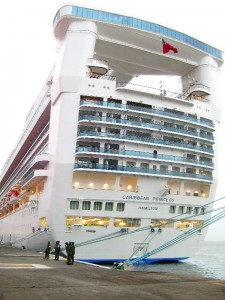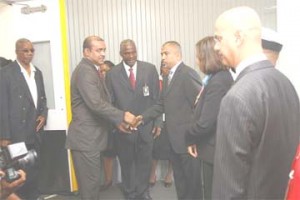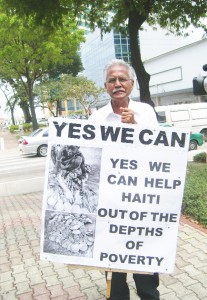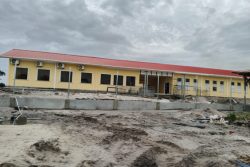The Fifth Summit of the Americas opens in Trinidad and Tobago today against a backdrop of increasing hemispheric concerns, and criticisms at the domestic level, of how the locals will benefit after the dialogue has ended.
The impressive landscape and infrastructural changes in Port-of-Spain including the twin luxury cruise ships here specifically for the summit signals the huge government investment, but Trinidadians are largely concerned with whether taxes will be increased in another few months as a result of it all.

But Caricom’s Chairman, Belize Prime Minister Dean Barrow assured yesterday that the people in the region can expect to benefit from meaningful discussions in Trinidad. He underscored the importance of advancing the human condition of people across the hemisphere saying that issues such as climate change and US policy towards the Caribbean are to be discussed with the hope of fostering “improved relations”.
Barrow emphasized patience and a need for people looking on to understand that a myriad of issues are facing the hemisphere. He noted that Caribbean leaders will sit down for bi-lateral talks with US President Barack Obama. Barrow warned that is important that hemispheric leaders do not walk away from the summit without unanimity on the key aspects of the declaration.
The Fifth Summit of the Americas is being held under the theme, ‘Securing our citizens’ future by promoting human prosperity, energy security and environmental sustainability’.

A sharp contrast of animation and dreariness punctuated the atmosphere in the city as the Heads of Governments arrived yesterday in a constant flow of new diplomatic vehicles that shuttled from Piarco International Airport to the Hyatt Regency Hotel. While there appeared to be some interest in the arrival of a few leaders including Guyana’s President Bharrat Jagdeo, who is recognized here for his advocacy on climate change, the arrivals were muted.
It was difficult for the international media to get close to any of the arriving heads due to the rigorous security measures in place. Security is a key feature of the summit, and many of the arrangements isolate the majority of the city’s populace. As of today certain areas are off limits for residents until the summit ends.

While he is yet to touch down in Trinidad President Obama dominates the conversations on the streets and in restaurants. There is constant talk of his expected arrival and what he is likely to say to the people of the region through dialogue with the other leaders.
The US President appears to be the only reason some are paying attention to the summit.
“If Obama didn’t coming it would not have made much sense”, a resident said as he stood in Independence Square a short distance from the summit zone. He sported an Obama jersey and announced that he was proudly wearing it. He was unable to name two regional leaders outside of Trinidad’s Prime Minister, Patrick Manning and Guyana’s Bharrat Jagdeo.
The news of Michelle Obama opting to remain in the US instead of travelling to Trinidad for the weekend hit many persons hard. A few questioned concluded that she did not see the summit as being of major importance while others said that her reason to say behind and spend time with her girls was commendable.
The Obamas were also on the mind of a protester at Independence Square, who said that people in the country are obsessing over the US President for the wrong reasons. The man, who identified himself only as Ishmael, spoke of Obama visiting Trinidad and being made aware in direct fashion of the plight of the Cuban and Haitian people.
“We are always talking about him coming here, but what do we hope to bring to his attention, and why not raise the real issues such as poverty and the Cuban embargo”, Ishmael said rhetorically.
He held a poster in his hands depicting hunger in Haiti and told Stabroek News that he is hoping that regional leaders raise the issue of Haiti directly with the US President. Ishmael, who sells books, said he is on a time off during the summit to protest on behalf of Haiti and Cuba.
Cuba, which was the only Latin American country not included in the summit, came up in many of formal and informal conversations. Trinidadians are openly supportive of the Caribbean island and are forthright in calling on the US to change the nature of his policy towards Cuba.
Stakeholders at the Civil Society Forum that wrapped up after a two-day session issued a strong statement on Cuba that called on the US government to restructure its relations with Cuba and end the trade embargo.
Barrow spoke briefly about Cuba saying that the Caribbean region has been firm on its position on Cuba by calling for an end to the embargo. While he would not say if the issue of Cuba would be raised in the bi-lateral discussions with the US President, there is some perception that regional leaders intend to address it.








